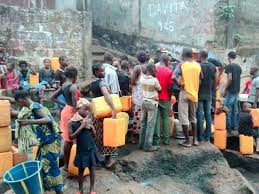By Sulaiman Aruna Sesay
Water scarcity is a global concern that has been on the rise in recent years. Sierra Leoneans are among the many people facing this crisis. This West African country is home to 8,963,859 people whose livelihoods rely on the availability of water. The country’s water resources are dwindling, leaving many Sierra Leoneans with no access to clean drinking water.
Sierra Leoneans have been battling water scarcity for years. The country is prone to periodic droughts and flooding, which have adversely impacted the availability of water. It is not a secret that, over-exploitation of water resources, population growth, and poor water management practices have exacerbated the problem. This has led to frequent water shortages, especially during the dry season, and has made the available water unsafe to drink.
The consequences of water scarcity in Sierra Leone are dire. Women and children bear the brunt of this crisis as they are often tasked with fetching water, which involves walking long distances in search of water sources. This takes up most of their time, leaving little time for them to engage in other productive activities. The water they collect is often contaminated, leading to widespread waterborne diseases, including cholera and diarrhoea.
The Government of Sierra Leone has made several efforts to address the water scarcity crisis. This includes partnering with international aid organizations and created separate institution like the Sierra Leone Water Company (SALWACO) to provide water purifiers and digging wells in remote areas of the country. These efforts have been inadequate, and the water scarcity crisis still persists.
The question on everyone’s lips is, will Sierra Leoneans’ plight be heard? The world leaders, particularly those who sit in international organizations, should pay attention to the water scarcity crisis in Sierra Leone. They should formulate policies, allocate resources, and work with the Sierra Leonean government to address this crisis. It is time for the world to recognize that water scarcity is not just a local problem but a global issue that requires collective action.
International organizations and non-governmental organizations should intensify their efforts to provide safe and clean water to the affected communities. This can be achieved by improving water supply infrastructure, promoting water conservation practices, and educating communities on proper water management practices.
Sierra Leoneans are battling a water scarcity crisis that has far-reaching implications. This crisis needs urgent action from both the Sierra Leonean government and the international community. Failure to act now will lead to more dire consequences, exacerbating poverty and further endangering the lives of millions of people. The world should lend Sierra Leoneans a listening ear and provide the much-needed support to address this crisis.










